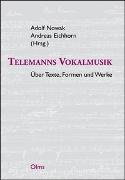| Artikelnummer | 9783487138329 |
|---|---|
| Produkttyp | Buch |
| Preis | 91,00 CHF |
| Verfügbarkeit | Lieferbar |
| Einband | Musik, Ideengeschichte, Musikgeschichte, Aufklärung, Kirchenmusik, Gattung, Musikästhetik, Ode, Literaturgeschichte, Lied, Musiktheorie, Komposition, Moderne, Kantate, Ästhetik, Vokalmusik, Telemann, Komponisten und Songwriter, Musikwissenschaft und Musiktheorie, Barock, entdecken, Kartonierter Einband (Kt) |
| Meldetext | Lieferbar in ca. 5-10 Arbeitstagen |
| Autor | Nowak, Adolf / Eichhorn, Andreas |
| Verlag | Olms Georg Vlg. |
| Weight | 0,0 |
| Erscheinungsjahr | 2008 |
| Seitenangabe | 444 |
| Sprache | ger |
| Anzahl der Bewertungen | 0 |
Telemanns Vokalmusik - Über Texte, Formen und Werke Buchkatalog
Georg Philipp Telemann (1681-1767) war in allen Bereichen der Instrumentalmusik und der Vokalmusik höchst produktiv und galt seinen Zeitgenossen als moderner und besonders innovativer Komponist, der sich von Ideen und Impulsen der Aufklärung beflügeln ließ. Die hier versammelten Aufsätze handeln von der noch wenig erforschten Vokalmusik Telemanns, unter besonderer Berücksichtigung derjenigen Gattung, die den größten Raum in ihr einnimmt, der kirchlichen Kantate. Die Kantate wird nach ihren Formen, Funktionen und Traditionen befragt, die ihr zugrundeliegende Dichtung wird unter literatur- und ideengeschichtlichen Gesichtspunkten untersucht. Darüber hinaus kommen verwandte Gattungen wie die weltliche Kantate, das Oratorium und die Oden- und Liedkomposition zur Sprache. Ein übergreifendes Interesse gilt den Einflüssen der Aufklärung und ihrer Ästhetik auf die Vokalmusik Telemanns, wobei sich der Begriff der "Klangrede", wie er von Telemanns Zeitgenossen Johann Mattheson geprägt wurde, als besonders fruchtbar erweist. Daß sich die Musik an Sinngliederung, Sprachmelos und Bildlichkeit der Rede orientiert und daß sie im Durchgang durch diese rhetorische Ausrichtung ihre besondere Autonomie in Konstruktion und Ausdruck gewinnt, ist für die Musikästhetik der Aufklärung ein zentraler Gedanke, der in der Musik Telemanns deutlich hervortritt. Georg Philipp Telemann (1681-1767) was highly productive in all areas of instrumental music, vocal music and opera, and was considered by his contemporaries to be a modern and particularly innovative composer who took inspiration from the ideas and intellectual stimulus of the Enlightenment. The essays collected here are concerned with Telemann's previously under-researched vocal music, with particular emphasis on the genre which makes up the largest part or it, the church cantata. The forms, functions and traditions of the cantata are critically examined and the poetry on which it is based is studied from the perspectives of literary history and the history of ideas. Related genres such as the secular cantata, the oratorio and settings of odes and songs are also discussed. There is a predominant interest in the influence of the Enlightenment and its aesthetics on Telemann's vocal music, in which the concept of 'musical eloquence' as defined by Telemann's contemporary Johann Mattheson proves a particularly fruitful area of research. The theory that music achieves its particular autonomy in construction and expression through its rhetorical orientation towards phrasing, vocal melos and linguistic representation is a central idea in Enlightenment musical aesthetics and is clearly represented in Telemann's music.
91,00 CHF
Lieferbar


Dieser Artikel hat noch keine Bewertungen.